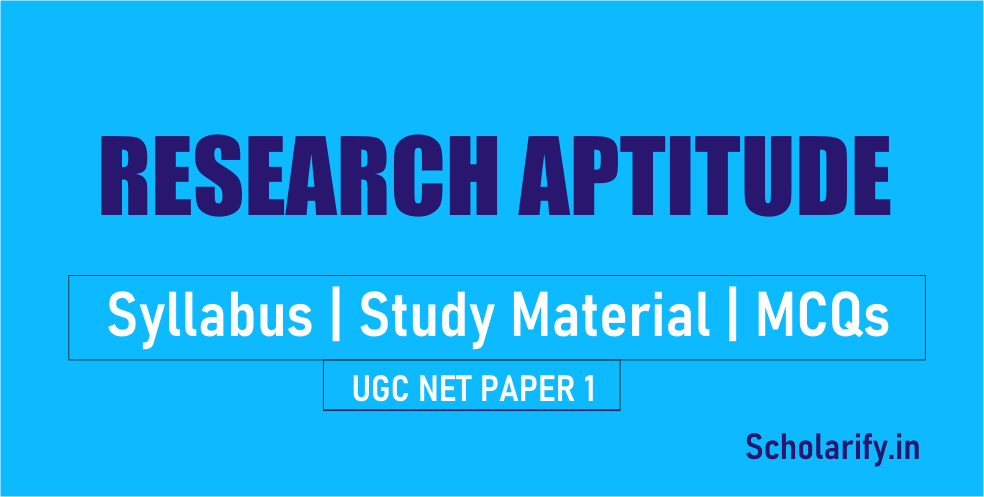
Research Aptitude is most important unit of NTA UGC NET Paper 1. This unit is the backbone for the prospective of research. We will learn from this unit from the basic concept to advanced knowledge. Research aptitude will be very useful topic for those aspirants who are trying to get qualify for NET /JRF. It will help in research career as well as in teaching.
Free Study Material / Notes of Research Aptitude
We provide free study materials or notes of research aptitude for the aspiring candidates. You will learn here according to new revised syllabus of NTA UGC NET Paper 1.
There are five topics of research aptitude in which one topic is new. The study materials available on this website are prepared by JRF qualified who are either working as an Assistant Professor or PhD Scholar.
Click on the link below to read the topics.
Research: Meaning, Types, and Characteristics, Positivism and Post-positivistic approach to research
Objectives of the Topic: In this topic you will learn about the basic concept of Research, Types of research, Characteristics etc. The positivism and post positivism approach to research is new in updated syllabus and this is also covered.
Methods of Research: Experimental, Descriptive, Historical, Qualitative and Quantitative methods
Objectives of the Topic: When you start the research, the first thing you will have to decide, the methods of research according to your topic and subject. This topic will teach you what is Methods of research, different types of Research Methods etc.
Steps of Research
Objectives: There are 7 main steps in research. In This topic, you will cover each step of research. This is a long and important topic of the research. You must go in details to learn each and every sub-topic under this.
Thesis and Article writing: Format and styles of referencing
Objectives of the topic: After completing steps of research, you will write thesis. This topic covers what is thesis format, how to write the report, what is the styles of referencing, which styles of referencing is famous and accepted by most the institutions etc.
Application of ICT in Research (New Topic)
Objectives of the topic: This a new topic included in revised syllabus of UGC NET Paper 1. You will learn; what are the ICT applications which are useful for Research work. This topic covers the list with explanations of different ICT tools which are very useful in thesis and article writing like, Mendeley, IBM SPSS, Online survey Tools etc.
Research Ethics
Research is base for further studies ether in science or social sciences. If research has done with some manipulations (like manipulation in data collection), the result would not be accepted for further refencing. This topic covers what is Research Ethics, how to avoid it, what is Plagiarism and tools for checking it etc. This is very important topic for aspiring Scholars.
Research Aptitude MCQ
1) The objectivity of the research can be enhanced
A) Through its reliability
B) Through its validity
C) Through its impartiality
D) All of the above
2) The assumptions are formulated on the basis of
A) Universality
B) Cultural background of a country
C) Specific characteristics of the castes
D) None of the above
3) The wrong statement related with research in
A) The research has been carried out for invention
B) The research has been carried out for name and fame
C) The research has been carried out for ornamental degrees
D) All the above items are incorrect in relation to research
4) The research work is not influenced by
A) The researcher himself
B) His pre-established assumptions
C) The curse of some other researchers
D) The wrong calculations
5) Research is a
A) Value oriented process
B) Passive process
C) Self-contained process
D) Discovery oriented process
6) The polluted facts can give birth to
A) A good research
B) Errorless research
C) Polluted research
D) Human sorrows
7) Suppose a researcher has some prejudices in relation to some problem, then the research carried out by him, is called as
A) Value oriented research
B) Polluted research
C) Inadequate research
D) Prejudiced research
8) The meaning of the definition of a problem is
A) To define the complex words in the problem and suggest their meaning in the light of the problem
B) To limit the problem in words
C) To present the definition of different authors related to problem
D) None of the above
9) The advantage of synopsis is
A) It clearly shows the way of research
B) It visualizes the various difficulties related with different steps of research
C) It helps in planning various steps of the research
D) All the above
10) The meaning of the probability sampling is
A) Where lies the uniform probability of inclusion of all the elements of the population in a sample
B) Where the complete representativeness of the population is considered
C) Where no prejudices are existed with any element of the sample
D) All the above
11) Hypothesis is
A) A thoughtful statement
B) A forwarding statement
C) A temporary solution
D) All the above
12) The research problems available in the field of philosophy are called as
A) Philosophical problems
B) Historical problems
C) Presentable problems
D) Invisible problems
13) A good synopsis is considered as
A) A half-way researches
B) A complete research
C) A partial research
D) A beginning of research
14) The advantage of the sample is
A) Time saving
B) Money-saving
C) Energy-saving
D) All the above
15) The Purposive sample will be
A) Depending on the researcher’s whims
B) Based upon a specific objective of sampling procedure
C) Based on the excellent method of sampling
D) None of the above
Answer Key
1 – D, 2 – B, 3 – D, 4 – C, 5 – A, 6 – C, 7 – B, 8 – A, 9 – D, 10 – D, 11 – D, 12 – A, 13 – A, 14 – D, 15 – B